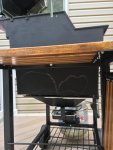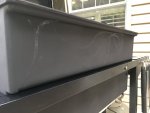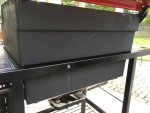You are using an out of date browser. It may not display this or other websites correctly.
You should upgrade or use an alternative browser.
You should upgrade or use an alternative browser.
*RESTORED* Tackling my First Restore - Genesis 1000
- Thread starter AHymel
- Start date
Clearly you didn't spray the cook box for Weber Worms before you painted it.
THAT WASNT IN DRAB TO FAB! LOL
Typical aluminum stuff
Hmmmm, so this is... common?
I gotta ask. How did you prep the cook box for paint? Did you strip it down to bare aluminum or just paint over the original paint? What else did you do before painting?
Wire wheel to bare metal. Brake cleaner. Painted with I would estimate 2-3 coats of High Heat (Flat) spray paint.
Looking forward to thoughts.
Bruce
TVWBB 2-Star Olympian
It would seem you must have had some kind of containment on the cook box just prior to spraying. I have done dozens of cook boxes with a wire wheel and if cleaned and prepped before spraying, I have never seen anything like that. I have never used brake cleaner though. I have used Isopropyl Alcohol mostly.
The only other thing that I can think of is that the stain is on the outside and something got on the outside after it was painted and is now showing up with heat.
The only other thing that I can think of is that the stain is on the outside and something got on the outside after it was painted and is now showing up with heat.
Ed P
TVWBB Honor Circle
Aluminum + oxygen = aluminum oxide, a white crystalline powder. Aluminum oxide forms so fast that it causes contamination in TIG welding if you don't clean the aluminum and the filler rod immediately before welding. That white stuff on an old grill? Aluminum oxide. Also, those streaks look surprisingly like wire wheel tracks. Do you have a picture right before painting to compare? Maybe you dug in a little deeper in those tracks and it exposed raw aluminum versus the surrounding area.
So it could be the paint didn't adhere properly and is flaking off, or there isn't enough paint in that area to prevent the aluminum from reacting with the oxygen in the air. Just my $0.02.
So it could be the paint didn't adhere properly and is flaking off, or there isn't enough paint in that area to prevent the aluminum from reacting with the oxygen in the air. Just my $0.02.
Bruce
TVWBB 2-Star Olympian
I use a microfiber towel soaked in alcohol and wipe it all down just before painting. If it was already cleaned with water and some cleaner before then, I see no reason to scrub it again. The alchohol is just to clean off any residue and dust/dirt that may have gotten on it since cleaning it along with oil residue from handling it.
Going straight from stripping the cook box with a grinder and cup brush, you likely still have plenty of oil and contaminants on the bare aluminum. That Is why I would clean it with water and a good cleaner or even dish soap after grinding it. And then use the solvent (alcohol, xylene, mineral spirits, brake cleaner) just before spraying to get the residue from the water and cleaner off along with any dirt and oily fingerprints that has accumulated.
Going straight from stripping the cook box with a grinder and cup brush, you likely still have plenty of oil and contaminants on the bare aluminum. That Is why I would clean it with water and a good cleaner or even dish soap after grinding it. And then use the solvent (alcohol, xylene, mineral spirits, brake cleaner) just before spraying to get the residue from the water and cleaner off along with any dirt and oily fingerprints that has accumulated.
I appreciate the insight. It doesn’t look like the paint is any lighter or scraped in those areas so I’d like to believe it’s not uneven paint coverage that exposed. Also, sadly don’t have a picture right before painting. It was as clean and even as I can remember But you’re right, I suppose it could be uneven grinding.Aluminum + oxygen = aluminum oxide, a white crystalline powder. Aluminum oxide forms so fast that it causes contamination in TIG welding if you don't clean the aluminum and the filler rod immediately before welding. That white stuff on an old grill? Aluminum oxide. Also, those streaks look surprisingly like wire wheel tracks. Do you have a picture right before painting to compare? Maybe you dug in a little deeper in those tracks and it exposed raw aluminum versus the surrounding area.
So it could be the paint didn't adhere properly and is flaking off, or there isn't enough paint in that area to prevent the aluminum from reacting with the oxygen in the air. Just my $0.02.
Hmmmm so you have any solutions or preventative measures? I’m all ears, but would prefer to not completely scrape and reapply, but certainly would if that would do the trick.Yes it's very common. In my experience happens more often than not
So your suggestion is after grinding to clean with iso alcohol. I can give that a whirl when I clean it up this winter.I use a microfiber towel soaked in alcohol and wipe it all down just before painting. If it was already cleaned with water and some cleaner before then, I see no reason to scrub it again. The alchohol is just to clean off any residue and dust/dirt that may have gotten on it since cleaning it along with oil residue from handling it.
Going straight from stripping the cook box with a grinder and cup brush, you likely still have plenty of oil and contaminants on the bare aluminum. That Is why I would clean it with water and a good cleaner or even dish soap after grinding it. And then use the solvent (alcohol, xylene, mineral spirits, brake cleaner) just before spraying to get the residue from the water and cleaner off along with any dirt and oily fingerprints that has accumulated.
Thanks for all the insight everyone!
Ed P
TVWBB Honor Circle
Did you do this all in an afternoon? Could be better to let the aluminum sit overnight or a day or two after wire brushing and washing with water/soap (or cleaner) before wiping down with solvent and painting? What does Bruce do?Wire wheel to bare metal. Brake cleaner. Painted with I would estimate 2-3 coats of High Heat (Flat) spray paint.
Looking forward to thoughts.
There's this:
Aluminium oxidises very readily but this is advantageous as the aluminium oxide is tougher than the aluminium metal as so the oxide protects the metal. The aluminium oxide is also less dense than the metal and so takes up more space than the metal and so as the metal is oxidised it puts the aluminium oxide in compression and this helps provide the surface with a good barrier layer that reduces the rate of any further oxidation.
(from short paper here) http://www.cabuk1.co.uk/FAQ 7 Oxidation of aluminium.pdf
Yea it was over an afternoon in about 90 degree heat and direct sunlight. That could be it.Did you do this all in an afternoon? Could be better to let the aluminum sit overnight or a day or two after wire brushing and washing with water/soap (or cleaner) before wiping down with solvent and painting? What does Bruce do?
There's this:
Aluminium oxidises very readily but this is advantageous as the aluminium oxide is tougher than the aluminium metal as so the oxide protects the metal. The aluminium oxide is also less dense than the metal and so takes up more space than the metal and so as the metal is oxidised it puts the aluminium oxide in compression and this helps provide the surface with a good barrier layer that reduces the rate of any further oxidation.
(from short paper here) http://www.cabuk1.co.uk/FAQ 7 Oxidation of aluminium.pdf
Silly question, but what do you mean by “solvent?” Essentially, what should I be cleaning with after cup grinding?
Bruce
TVWBB 2-Star Olympian
So your suggestion is after grinding to clean with iso alcohol. I can give that a whirl when I clean it up this winter.
Thanks for all the insight everyone!
I suggest you grind it clean as possible, then scrub it with soap and water or some other degreasing cleaner. Then finish it off with a solvent (alcohol, xylene, mineral spirits, brake cleaner) wipe just before painting. Just make sure you let the box completely dry between each step. Close is not good enough.
Ed P
TVWBB Honor Circle
Bruce uses 99% isopropyl alcohol (rubbing alcohol), I think. Rubbing alcohol contains water (that remaining 1% is water) and is hygroscopic (meaning it will attract water from the air and dilute over time). Water and paint don't mix. Alcohol is also somewhat hard to source because of the coronavirus.So your suggestion is after grinding to clean with iso alcohol. I can give that a whirl when I clean it up this winter.
Thanks for all the insight everyone!
Alcohol is a solvent, mineral spirits is a solvent, acetone is a solvent. But Bruce is the man with the experience, so I defer to him.
Bruce
TVWBB 2-Star Olympian
I am not a chemist, but I have used even 72% rubbing alcohol with good success. Even if there is water in it, I would assume that will evaporate as well. But, to be safe, I suggest anyone use the mineral spirits or acetone or others as I have seen others warm of the water content in alcohol.
LMichaels
TVWBB 2-Star Olympian
Again. Never use mineral spirits as painting prep. The paint will fail in a heart beat. MS is only diesel fuel that knows someone. IOW it's oily. It's fine for cleaning machine parts (which I do a lot) but NOT for paint prep. Also any hydroscopic material will pull water from the air and or leave water behind. So Isopropyl is not the best choice. However in high concentrate like Bruce uses it's not as bad. But use it in hot humid weather on metal and you will see what I mean. If you wash the parts with soap and water VERY VERY thorough rinsing is needed. Follow by a long dry time in the sun and then with a PROPER paint prep solvent. Like PrepSol, lacquer thinner, etc. Watch a body man in a paint shop. You will never see any hydroscopic material in use and you will NEVER see mineral spirits in use.
Brian B Atlanta
TVWBB Gold Member
I have used Acetone for many years cleaning metal before painting. It drys quickly no need to wait very long to apply paint. I don't spray in direct sunlight either same would apply to deck stain my climate its been over 90 everyday for 2 weeks in ATL.
That really to me looks like prep work almost like you did not get it degreased enough was hidden by the paint then when you fired it up the problem showed up.
If it was me and your bored get some Acetone or as Bruce says he has success with alcohol. I would wipe down the lower back of the firebox nobody sees then mask appropriately and just try spraying over it and see what you get. You said you used a flat paint so it should blend with a few coats, if it works may save you having to grind it again. Then in the winter if it bugs you pull the firebox and paint it again.
That really to me looks like prep work almost like you did not get it degreased enough was hidden by the paint then when you fired it up the problem showed up.
If it was me and your bored get some Acetone or as Bruce says he has success with alcohol. I would wipe down the lower back of the firebox nobody sees then mask appropriately and just try spraying over it and see what you get. You said you used a flat paint so it should blend with a few coats, if it works may save you having to grind it again. Then in the winter if it bugs you pull the firebox and paint it again.



